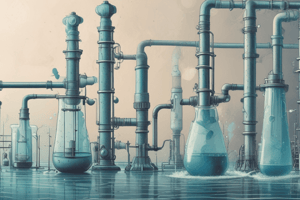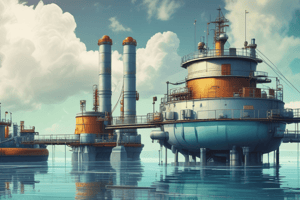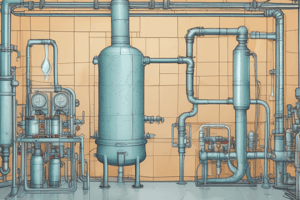Podcast
Questions and Answers
What percentage of water is contained in oceans and seas?
What percentage of water is contained in oceans and seas?
96.5%
What term describes the property of water to form an insoluble curd with soap?
What term describes the property of water to form an insoluble curd with soap?
Hardness
Hard water requires more soap to form a lather.
Hard water requires more soap to form a lather.
True (A)
The presence of Ca+2 and Mg+2 ions in water makes it _____.
The presence of Ca+2 and Mg+2 ions in water makes it _____.
Which of the following is an example of temporary hardness?
Which of the following is an example of temporary hardness?
How can temporary hardness be removed?
How can temporary hardness be removed?
What type of hardness cannot be removed by boiling?
What type of hardness cannot be removed by boiling?
What are the primary ions responsible for hard water?
What are the primary ions responsible for hard water?
The hardness of a substance in terms of CaCO3 is expressed in _____.
The hardness of a substance in terms of CaCO3 is expressed in _____.
What is the relationship between ppm and mg/l?
What is the relationship between ppm and mg/l?
Flashcards are hidden until you start studying
Study Notes
Water Sources and Composition
- Oceans and seas comprise 96.5% of Earth's water.
- Snow and groundwater account for 1.74% and 1.7%, respectively.
Types of Water
- Soft Water: Lathers easily with soap.
- Hard Water: Requires more soap to lather due to soap-destroying properties.
Hard Water Composition
- Contains calcium (Ca²⁺) and magnesium (Mg²⁺) ions, preventing lather formation with soap.
- Reacts with soap to create insoluble products, resulting in scum.
Hard Water Reactions
- Reaction with calcium chloride produces calcium stearate, an insoluble compound.
- Reaction with magnesium sulfate results in magnesium stearate, also insoluble.
Hardness Definition
- Hardness: Property of water to form insoluble curd with soap instead of lather, caused by bicarbonates, sulfates, and chlorides of Ca and Mg.
Types of Hardness
-
Temporary Hardness:
- Caused by calcium and magnesium bicarbonates; removable by boiling.
- Formation from slightly acidic rainwater reacting with limestone.
-
Permanent Hardness:
- Caused by chlorides and sulfates of Ca and Mg; cannot be removed by boiling, needs softening agents.
Temporary Hardness Mechanism
- Slightly acidic rainwater (due to dissolved CO2) forms carbonic acid, reacting with limestone to yield soluble calcium hydrogen carbonate.
Permanent Hardness Characteristics
- Formed by the presence of Mg²⁺ and Ca²⁺ sulfates and chlorides.
- Requires softening agents or ion exchange methods for removal.
Hard Water Removal Techniques
- Temporary Hardness Removal: Achieved by boiling (e.g., converts bicarbonates to carbonates).
- Permanent Hardness Removal: Achieved using softening agents like sodium carbonate, ionic exchange methods, and zeolite/permutit methods.
Harmful Effects of Hard Water
- Hard water can lead to increased soap consumption, scaling in pipes, and decreased soap efficacy.
Degree of Hardness Measurement
- Expressed in terms of CaCO₃ equivalent (in mg/l).
- Clarke Degree: Equivalent of CaCO₃ in 70,000 parts of water.
- French Degree: Equivalent of CaCO₃ in 100,000 parts of water.
- 1 ppm = 1 mg/l = 0.1 French Degree = 0.070 Clarke Degree.
Studying That Suits You
Use AI to generate personalized quizzes and flashcards to suit your learning preferences.




